Frühere Working Papers

Working Paper Series N° 14 | August 2023
Alessandro Di Nola, Luke Haywood, Haomin Wang (2023)
Abstract:
Women are more likely to work in jobs with low hours than men. Low-hour jobs are associated with lower hourly wages and are more likely impacted by minimum wages that set a floor on hourly wages. We document that the first German minimum wage significantly increased women’s transition towards jobs with higher weekly hours. We construct and estimate an equilibrium search model with demographic and firm productivity heterogeneity. The model replicates observed gender gaps in employment, hours and wage and the positive relationship between hours and hourly wages.
We implement the minimum wage in our model with a penalty to address non-compliance. Based on our model, the minimum wage primarily reduces the gender income gap through the gender wage gap. At its 2022 level, the German minimum wage reduces the gender employment and hours gap due to an upward reallocation effect, resulting in women’s increased participation in higher-hour jobs with lower separation rates. The upward reallocation effect is the strongest for women with children and varies by marital state and spousal income. While the minimum wage only modestly discourages firms from posting jobs, it shifts job offers toward full-time positions.
Working Paper Series N° 13 | April 2023
Almuth Scholl (2023)
Abstract:
This paper studies how distributional and electoral concerns shape sovereign default incentives within a quantitative model of sovereign debt with heterogeneous agents and non-linear income taxation. The small open economy is characterized by a two-party system in which the left-wing party has a larger preference for redistribution than the right-wing party. Political turnover is the endogenous outcome of the electoral process. Fiscal policy faces a tradeoff: On the one hand, the government has incentives to finance redistribution via external debt to avoid distortionary income taxation. On the other hand, the accumulation of external debt raises the cost of borrowing. Quantitative findings suggest that the left-wing party implements a more progressive income tax, is more prone to default, and has a lower electoral support than the right-wing party due to worse borrowing conditions and the distortionary effects of income taxation. In equilibrium, electoral uncertainty raises sovereign default risk.
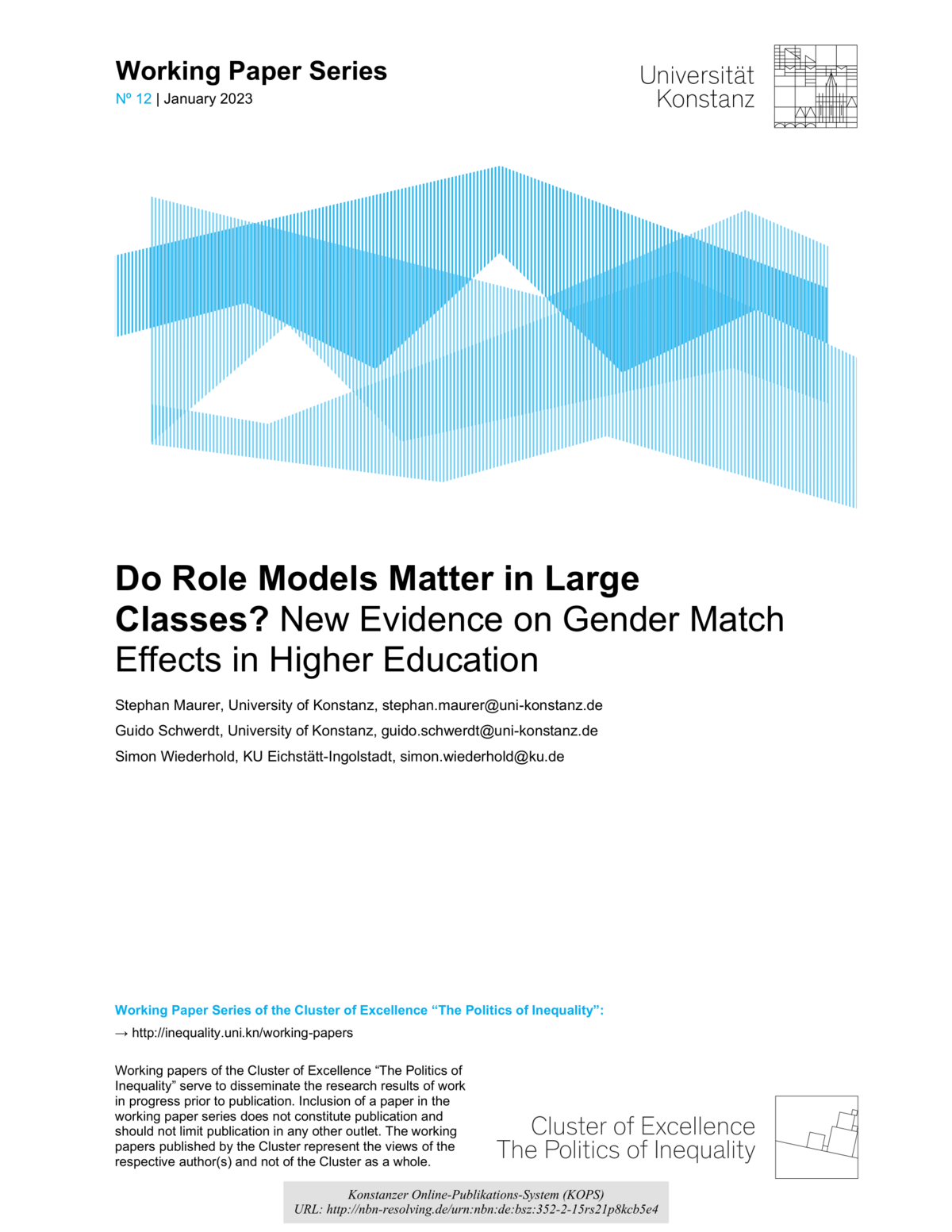
Working Paper Series N° 12 | Januar 2023
Stefan Maurer, Guido Schwerdt, Simon Wiederhold (2023)
Abstract:
We study whether female students benefit from being taught by female professors, and whether such gender match effects differ by class size. We use administrative records of a German public university, covering all programs and courses between 2006 and 2018. We find that gender match effects on student performance are sizable in smaller classes, but do not exist in larger classes. This difference suggests that direct and frequent interactions between students and professors are important for the emergence of gender match effects. Instead, the mere fact that one’s professor is female is not sufficient to increase performance of female students.
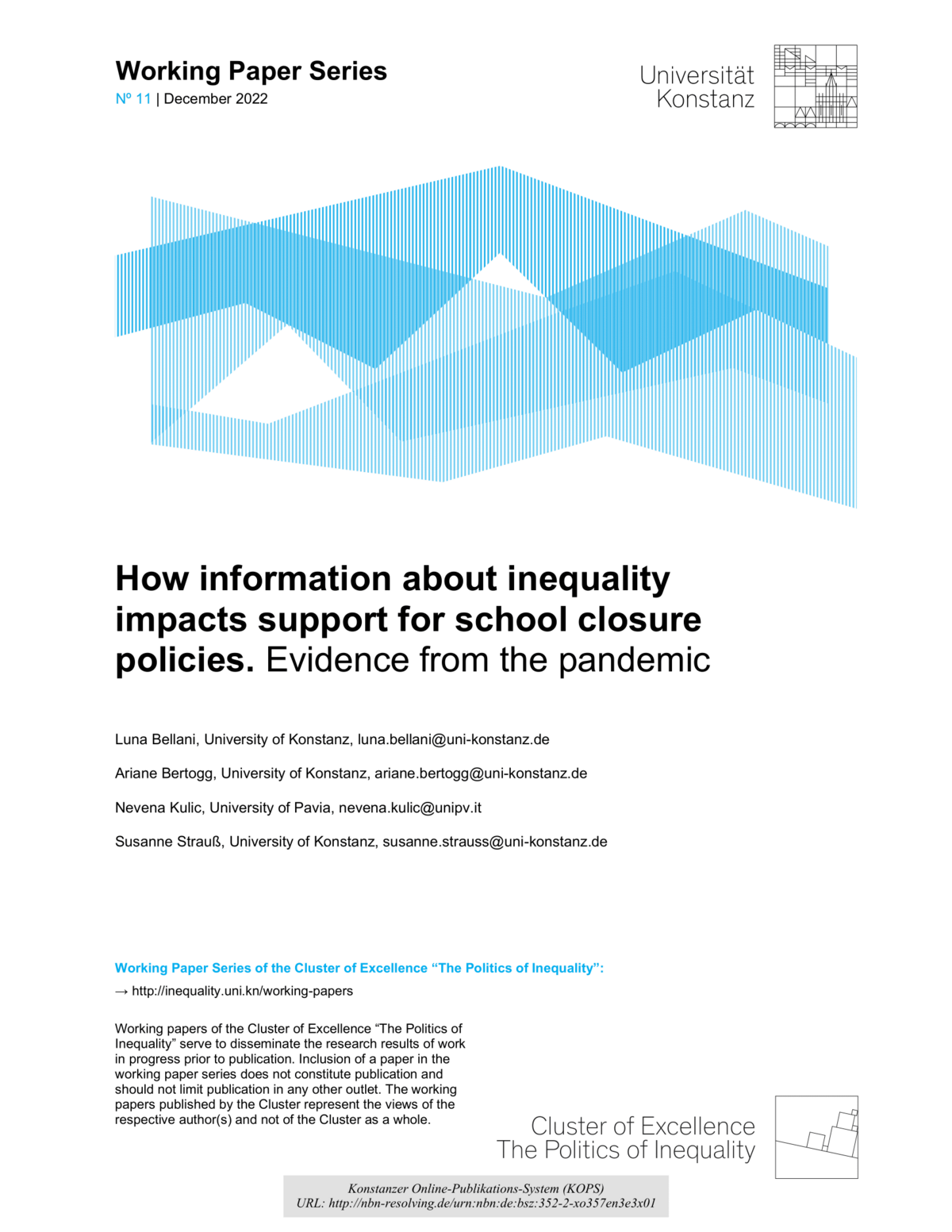
Working Paper Series N° 11 | Dezember 2022
Luna Bellani, Ariane Bertogg, Nevena Kulic, Susanne Strauß (2022)
Abstract:
The increase in inequalities during the ongoing COVID-19 pandemic has been the topic of intense scholarly and public debate. School closures are one of the containment measures that have been debated most critically in this regard. What drives support for school and daycare/kindergarten closures during a public health crisis such as the current COVID-19 pandemic? More specifically, do inequality concerns affect this support? To identify causal linkages between awareness of inequalities and support for school and daycare/kindergarten closures, we use a survey experiment with information treatment, in which we randomly assign information designed to prime the respondents to think about either education inequality, gender inequality, or both. Based on an original survey experiment involving more than 3,000 respondents, conducted in spring 2021 at the end of a long lockdown in Germany, our findings show that concerns about education inequality and gender inequality are equally important for decreasing support for preschool and primary school closures, while they do not seem to matter regarding secondary school closures.
– – –
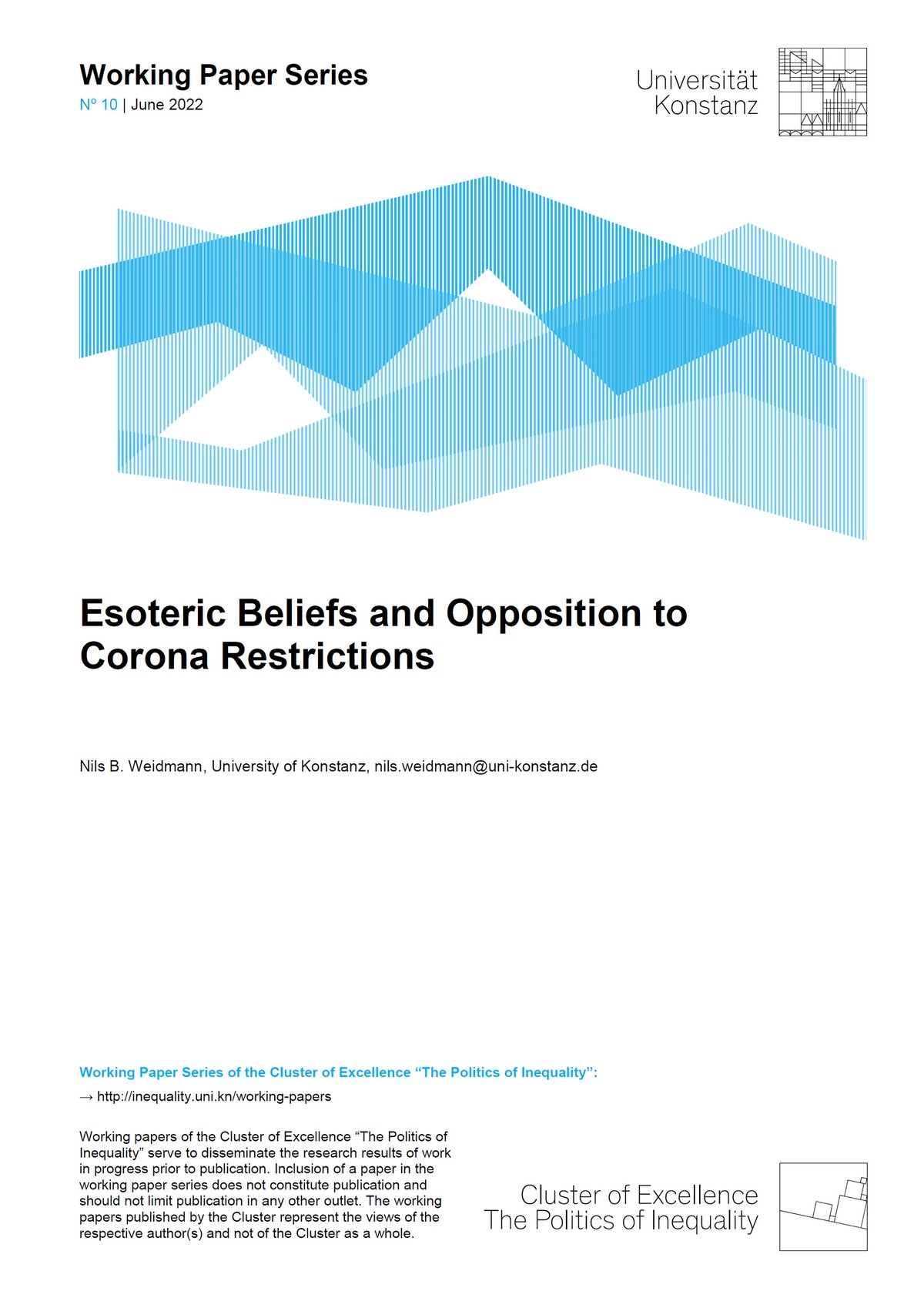
Working Paper Series N°10 | Juni 2022:
Nils B. Weidmann (2022): Esoteric Beliefs and Opposition to Corona Restrictions
Abstract:
Disagreement over governmental measures against the spread of the Corona virus has led to increased societal division and polarization in many countries worldwide. Scholars typically locate the sources of resistance against these measures on the right of the political spectrum. This article argues that this explanation is too simple. Using fine-grained spatial data for Germany, it tests whether opposition to Corona restrictions (proxied with electoral support for a new party against governmental Corona measures) is systematically linked to esoteric and anthroposophical beliefs, which are traditionally found on the political left. Using new data on the distribution of natural healers, homeopathic doctors and Steiner schools, the article presents spatial analyses at the level of electoral districts and municipalities. The latter makes it possible to create matched samples for improved causal inference. Results confirm that both the presence of homeopathic doctors and Steiner schools are related to significantly higher opposition against Corona measures. This shows that resistance to governmental measures against the Corona pandemic originates from different societal groups, and will remain a major challenge for governments to address.
– – –
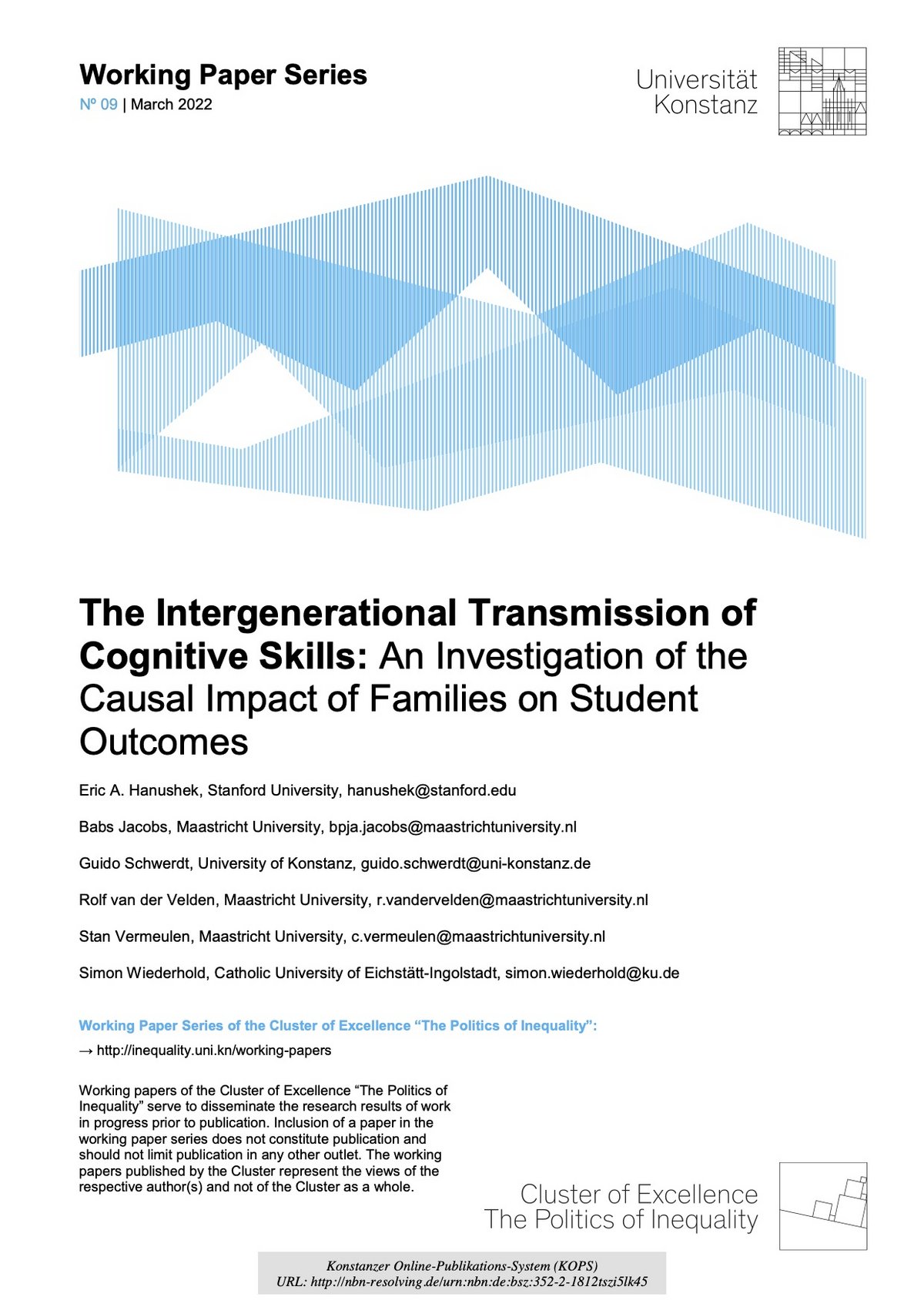
Working Paper Series N°09 | März 2022:
Eric A. Hanushek; Babs Jacobs; Guido Schwerdt; Rolf van der Velden; Stan Vermeulen; Simon Wiederhold (2022): The Intergenerational Transmission of Cognitive Skills : An Investigation of the Causal Impact of Families on Student Outcomes
Abstract:
The extensive literature on intergenerational mobility highlights the importance of family linkages but fails to provide credible evidence about the underlying family factors that drive the pervasive correlations. We employ a unique combination of Dutch survey and registry data that links math and language skills across generations. We identify the connection between cognitive skills of parents and their children by exploiting within-family between-subject variation in these skills. A causal interpretation of the between-subject estimates is reinforced by novel IV estimation that isolates variation in parent cognitive skills due to teacher and classroom peer quality. The between-subject and IV estimates of the key intergenerational persistence parameter are strikingly similar and close at about 0.1. Finally, we show the strong influence of family skill transmission on children’s choices of STEM fields.
– – –
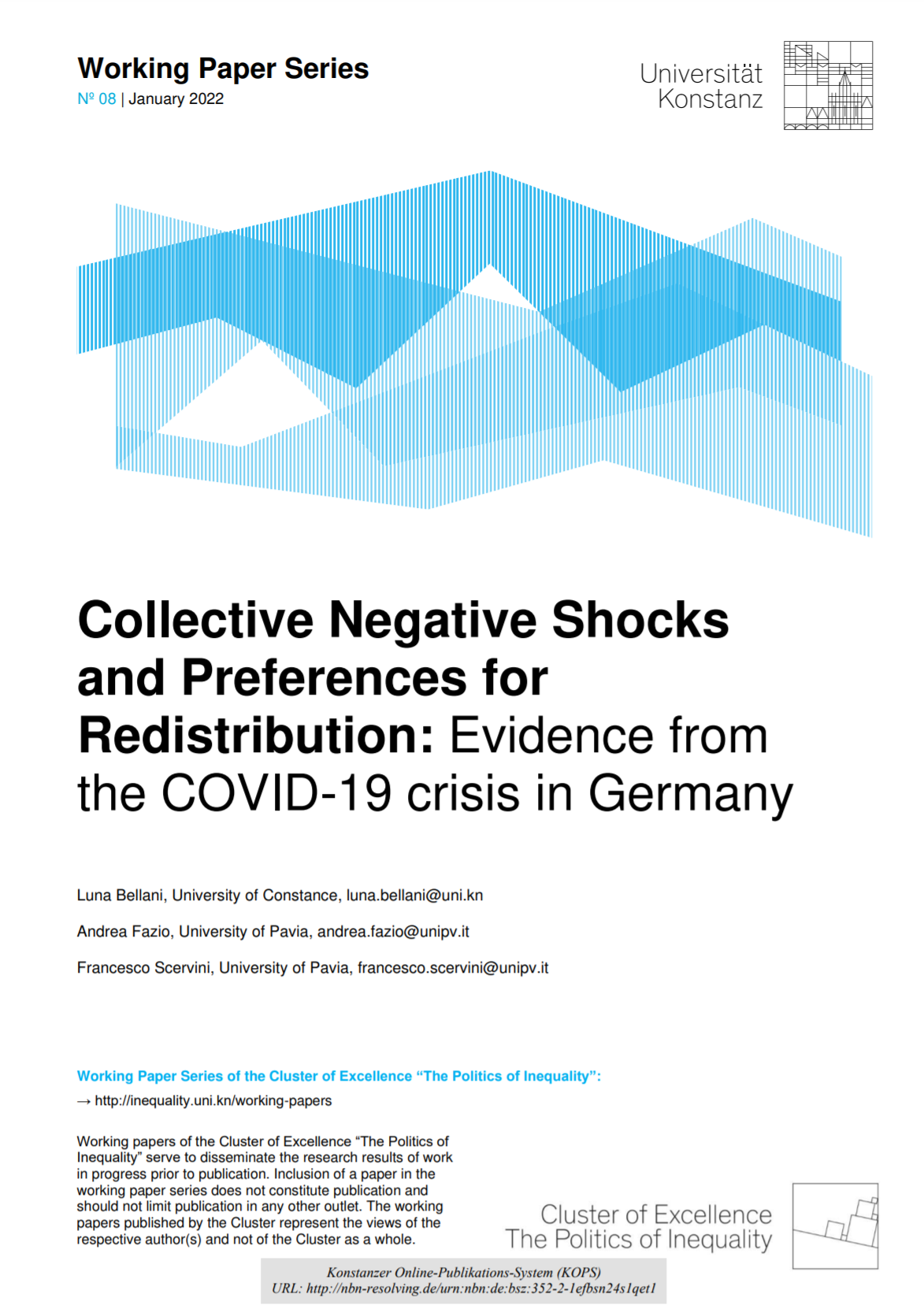
Working Paper Series N°08 | Januar 2022:
Luna Bellani; Andrea Fazio; Francesco Scervini (2022): Collective Negative Shocks and Preferences for Redistribution: Evidence from the COVID-19 crisis in Germany
Abstract:
Using new data from a three-wave panel survey administered in Germany between May 2020 and May 2021, this paper studies the impact of a negative shock affecting every strata of the population, such as the development of COVID-19, on preferences for redistribution. Exploiting the plausibly exogenous change in severity of the infection rate at the county level, we show that, contrary to some theoretical expectations, the worse the crisis, the lower the support for redistribution of our respondents. We provide further suggestive evidence that this is not driven by a decrease in inequality aversion, but this might be the result of a decrease in trust in the institutions who are in charge of redistributive policies.
– – –
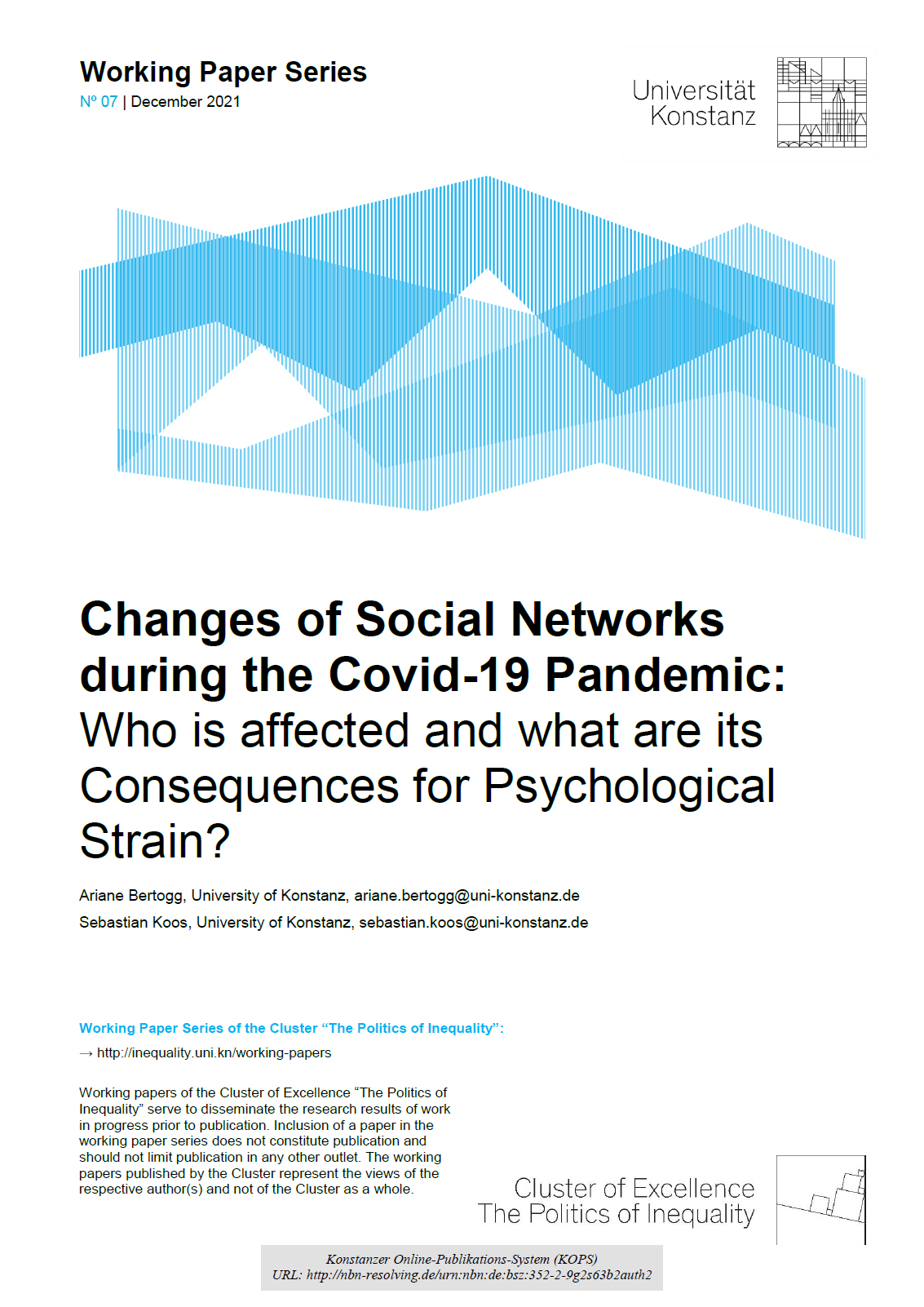
Working Paper Series N°07 | Dezember 2021:
Ariane Bertogg; Sebastian Koos (2021): Changes of Social Networks during the Covid-19 Pandemic : Who is affected and what are its Consequences for Psychological Strain?
Abstract:
Contact restrictions and distancing measures are among the most effective non-pharmaceutical measures to stop the spread of the SARS-CoV2 virus. Yet, research has only begun to understand the wider social consequences of these interventions. This study investigates how individuals’ social networks have changed since the outbreak of the pandemic and how these changes relate to psychological strain. Based on an online survey of the German adult population, four types of change are distinguished: loss, gain, and intensification of ties, as well as pandemic-related conflicts. One in two respondents has experienced at least one of these four changes. Loss is more frequently reported than gain of ties, and intensification occurred more frequently than conflicts. Loss of ties and conflicts are furthermore associated with higher levels of psychological strain.
– – –
Working Paper Series N°06 | Oktober 2021:
Erik Hornung, Guido Schwerdt, Maurizio Strazzeri (2021): Religious practice and student performance: Evidence from Ramadan fasting.
Abstract:
We investigate how the intensity of Ramadan affects educational outcomes by exploiting spatio-temporal variation in annual fasting hours. Longer fasting hours are related to increases in student performance in a panel of TIMMS test scores (1995–2019) across Muslim countries but not other countries. Results are confirmed in a panel of PISA test scores (2003–2018) allowing within country-wave comparisons of Muslim to non-Muslim students across Europe. We provide evidence consistent with the hypothesis that a demanding Ramadan during adolescence affects educational performance by facilitating formation of social capital and social identity via increased religious participation and shared experiences among students.
– – –
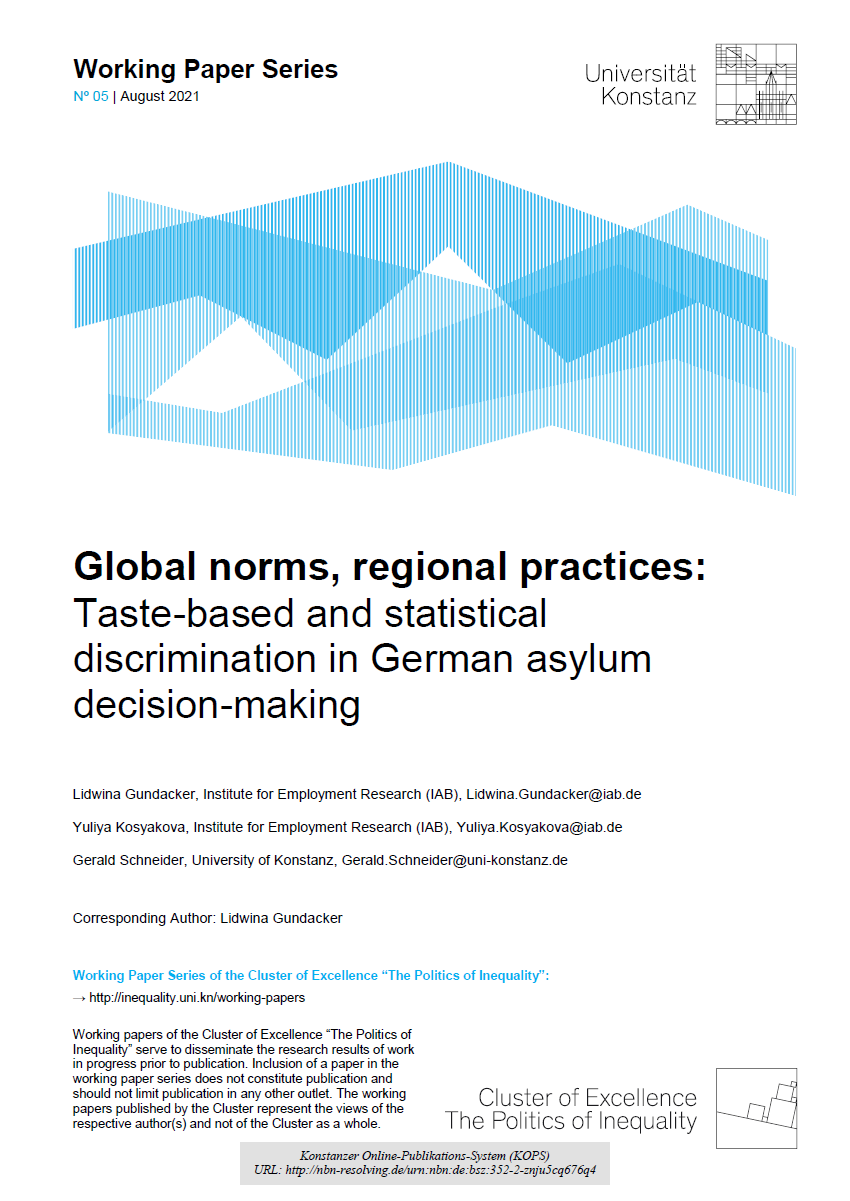
Working Paper Series N°05 | August 2021:
Lidwina Gundacker, Yuliya Kosyakova, Gerald Schneider (2021): Global norms, regional practices: Taste-based and statistical discrimination in German asylum decision-making.
Abstract:
Asylum policy-making in advanced democracies frequently faces the accusation that prejudice and stereotyping lead to erroneous decisions. The model of taste-based discrimination suggests that the biases of decision-makers or their peers against certain groups of applicants influence the evaluation of an asylum claim. Conversely, the concept of statistical discrimination implies that a dearth of information forces impartial decision-makers to resort to stereotypes. We examine both forms of discrimination, evaluating whether they shape asylum-seekers’ chances to receive protection in Germany, currently a key recipient country. Our empirical examination of a
representative refugee survey in Germany confirms that asylum decisions are subject to taste-based discrimination: males, Muslims, and applicants assigned to regions with a conservative population or government are less likely to obtain asylum or other forms of protection. Conforming to the theory of statistical discrimination, stereotyping against male or Muslim applicants’ manifests most pronouncedly if decision-makers suffer under high workload or possess little information. However, high information costs do not alter stereotyping in more conservative regions. Altogether, our study reveals that extra-legal reasons in the form of prejudice and stereotypes considerably undermine what should be the key criterion in assessing an asylum claim: the credibility of an individual’s need for protection.
– – –
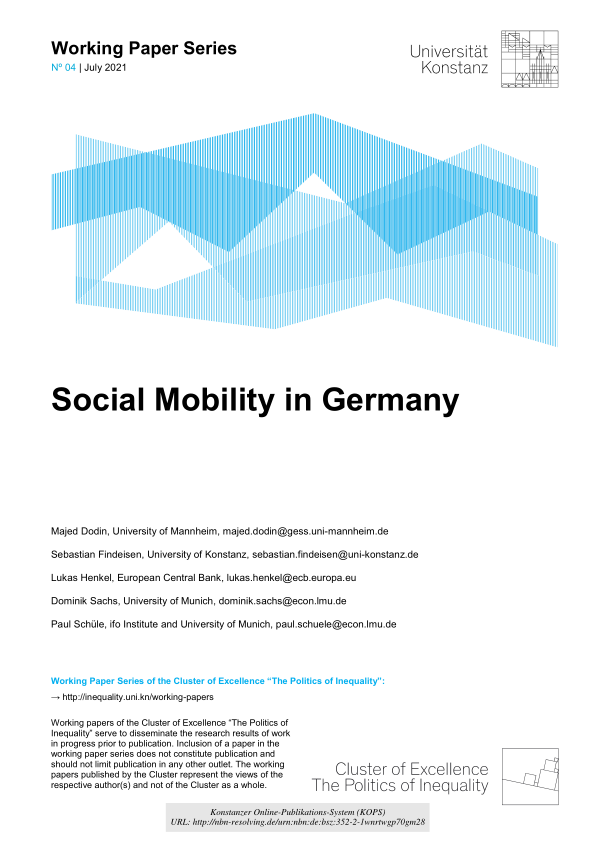
Working Paper Series N°04 | July 2021:
Majed Dodin, Sebastian Findeisen, Lukas Henkel, Dominik Sachs, Paul Schüle (2021): Social Mobility in Germany.
Abstract:
We characterize intergenerational social mobility in Germany using census data on the educational attainment of 526,000 children and their parents’ earnings. Our measure of educational attainment is the A-Level degree, a requirement for access to university and the most important qualification in the German education system. On average, a 10 percentile increase in the parental income rank is associated with a 5.2 percentage point increase in the probability to obtain an A-Level. This parental income gradient has not changed for the birth cohorts from 1980 to 1996, despite a large-scale policy of expanding upper secondary education in Germany. At the regional level, there exists substantial variation in mobility estimates. Place effects, rather than sorting of households into different regions, seem to account for most of these geographical differences. Mobile regions are, among other aspects, characterized by high school quality and enhanced possibilities to obtain an A-Level degree in vocational schools.
– – –
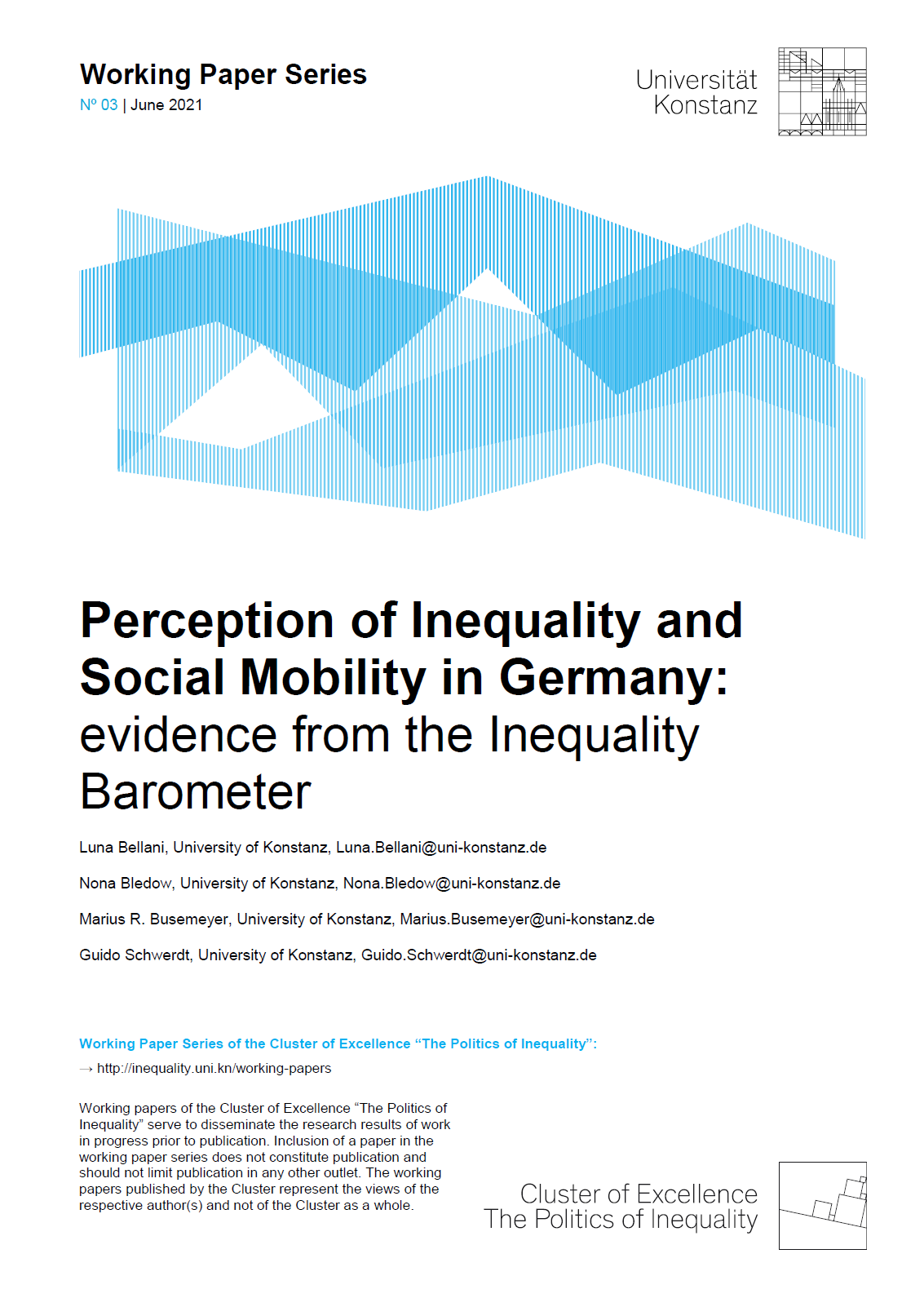
Working Paper Series Nº 03 | June 2021:
Luna Bellani, Nona Bledow, Marius R. Busemeyer, Guido Schwerdt (2021): Perception of Inequality and Social Mobility in Germany: evidence from the Inequality Barometer.
Abstract:
The Inequality Barometer is an online survey first conducted in Germany in 2020. It gauges individual perceptions of multiple aspects of inequality and social mobility as well as a range of policy preferences related to inequality. Responses were collected for a representative sample of the German resident population. The total sample consists of 6000 respondents. This paper introduces the basic structure and content of the survey and provides a detailed description of the procedures and methodologies adopted in the survey. It further presents preliminary descriptive results from the survey's core module. Our results indicate that there are substantial differences between how people in Germany perceive different aspects of inequality and social mobility. In sum, we find that respondents underestimate the extent of inequality in important ways, which has critical policy implications for the future of the welfare state in Germany and elsewhere, in particular in the post-Covid era.
– – –
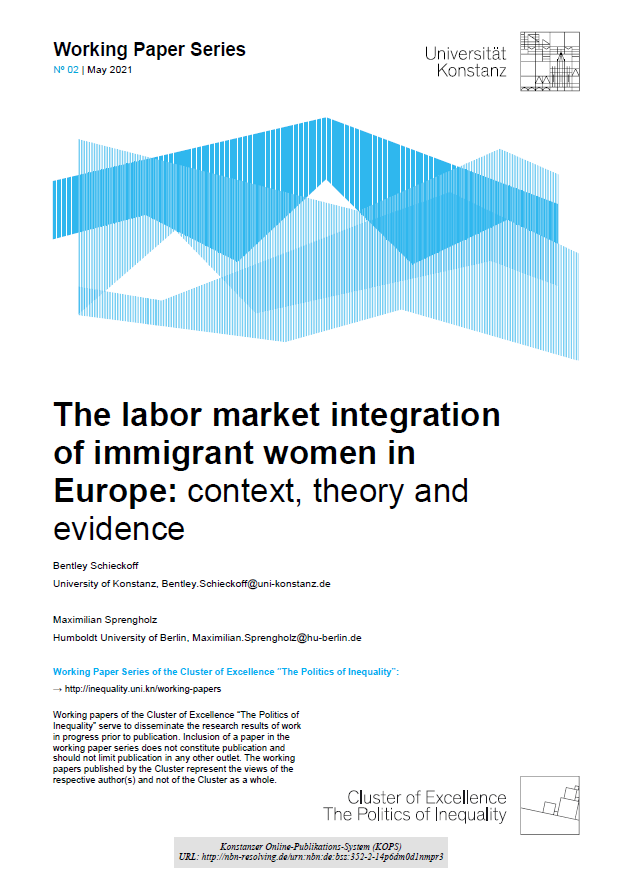
Working Paper Series Nº 02 | May 2021:
Bentley Schieckoff, Maximilian Sprengholz (2021): The labor market integration of immigrant women in Europe: context, theory and evidence.
Abstract:
Women represent an important component of the immigration population in Europe and have increasingly been a group of interest in academic studies, especially with regard to their integration outcomes. In this overview, we seek to provide a comprehensive resource for scholars of female immigrant labor market integration in Europe, to act both as a reference and a roadmap for future studies in this domain. We begin by presenting a contextual history of immigration to and within Europe since the Second World War, before outlining the major theoretical assumptions about immigrant women’s labor market disadvantage from economics and sociology. We then synthesize the empirical findings published between 2000 and 2020 and analyze how they line up with the theoretical predictions. We also present descriptive analyses with data from 2019, which expose any discrepancies between the current situation in European countries and the situation during the time periods considered in the reviewed studies.
As a group, immigrant women are often reported to experience significant disadvantages in their labor market integration, both compared to immigrant men and to native women. However, this type of approach glosses over the substantial heterogeneity in immigrant women’s experiences. Instead, our overview points to a selective disadvantage for immigrant women that is highly dependent on their country of origin and the reception context they encounter after immigration.
As article published in: SN Social Sciences ; 1 (2021). - 276.
– – –
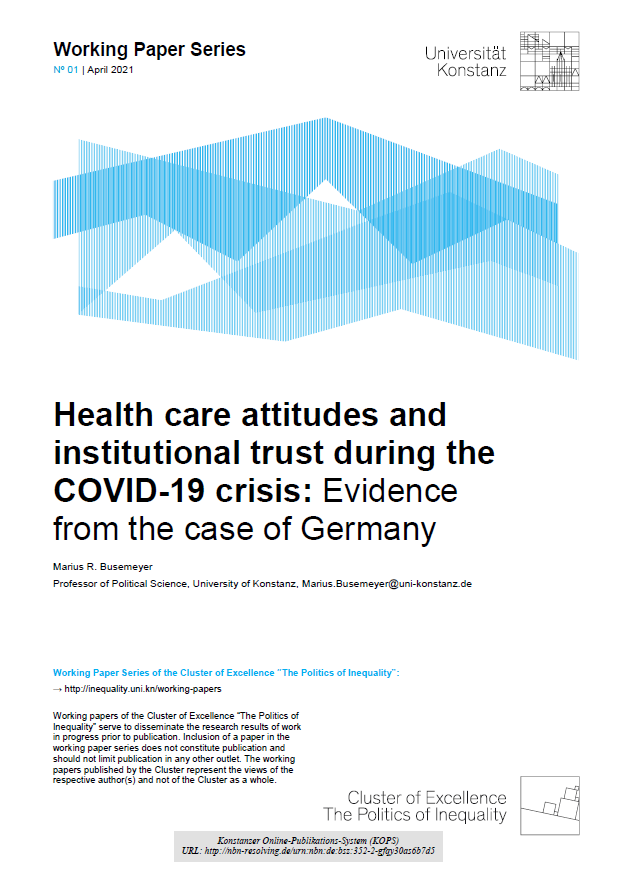
Working Paper Series Nº 01 | April 2021:
Marius R. Busemeyer (2021): Health care attitudes and institutional trust during the COVID-19 crisis: Evidence from the case of Germany.
Abstract:
The COVID-19 pandemic poses a tremendous challenge to health care systems around the globe. Using original panel survey data for the case of Germany, this paper studies how specific trust in the health care system’s ability to cope with this crisis has evolved over the course of the pandemic. It also examines whether this specific form of trust is associated with general political trust, as well as individual willingness to support additional public spending on health care. The paper finds that levels of trust in the health care system, both regarding efficiency and fairness, are relatively high and have (so far) remained stable or even slightly increased. The analysis also reveals a strong positive association between general political trust and specific trust in the health care system. In contrast, willingness to increase health care spending—taking into account fiscal constraints—is less strongly related to perceptions of performance and political trust.
